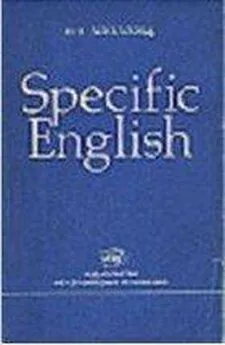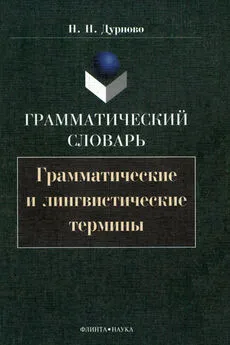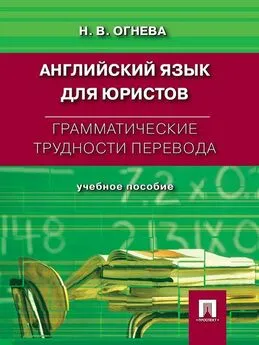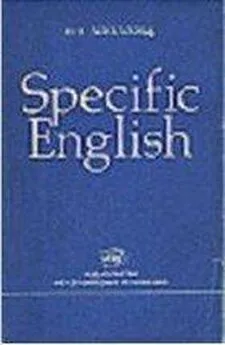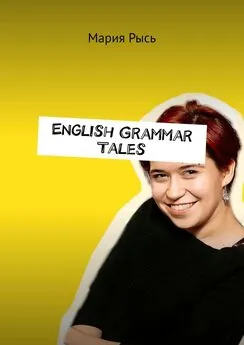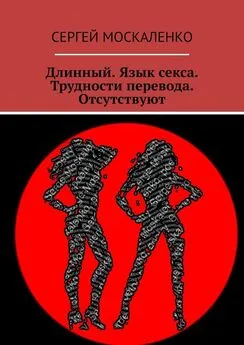Мария Аполлова - Specific English. Грамматические трудности перевода
- Название:Specific English. Грамматические трудности перевода
- Автор:
- Жанр:
- Издательство:«Международные отношения»
- Год:1977
- Город:Москва
- ISBN:нет данных
- Рейтинг:
- Избранное:Добавить в избранное
-
Отзывы:
-
Ваша оценка:
Мария Аполлова - Specific English. Грамматические трудности перевода краткое содержание
Пособие знакомит читателя с характерными особенностями английского языка и типичными случаями расхождений с русским языком. В нем суммируются те черты грамматического строя английского языка, которые в силу их специфики представляют трудность для учащихся.
В предлагаемом пособии ставится цель ознакомить учащихся, прошедших первоначальный курс английского языка, с некоторыми характерными системными особенностями этого языка и типичными случаями расхождений с русским языком. Поскольку способ выражения мысли проявляет себя прежде всего в строе языка, в его грамматике, то в пособии вскрываются именно особенности английской грамматики, притом те особенности, которые находили меньшее отражение, а главное — не подвергались достаточной отработке в учебной литературе.
Пособие не претендует на полноту и систематичность описания специфики английской грамматики, но обращает внимание учащихся на отдельные интересные, с точки зрения автора, моменты, которые и придают английской речи ее неповторимое своеобразие.
Кроме того, в пособии рассматриваются такие особенности английского языка, как конверсия, лаконизм английской речи, с одной стороны, и тенденция к известным усложнениям и избыточности — с другой, переходность глаголов и некоторые другие моменты.
Каждый раздел пособия содержит теоретические заметки с иллюстративными примерами в переводе автора. Пособие имеет упражнения, построенные на оригинальном языковом материале и направленные на закрепление практических и переводческих навыков.
Specific English. Грамматические трудности перевода - читать онлайн бесплатно полную версию (весь текст целиком)
Интервал:
Закладка:
She’s just the way the message said, only more so. Она как раз такая, как говорилось в радиограмме, только еще более такая. (определение)
Конверсии подвергаются даже междометия и звукоподражательные сочетания. Например:
You’d think the Old Man would okay air-conditioners for the offices. Можно подумать, что Старик одобрит кондиционеры в учреждениях.
More and more people came crowding in, to tapper-tap-tap with their feet. Все больше и больше людей входило, тесня друг друга, чтобы поплясать.
Из вышесказанного можно сделать вывод, что конверсия обеспечивает известную семантическую свободу слову, обогащая его, позволяя ему обрастать новыми значениями благодаря его свободному движению в предложении. Так грамматический строй оказывает свое влияние на лексику языка, приводя к многозначности слова.
Конверсия проникла даже в область словообразования. К словам одной части речи присоединяются аффиксы, свойственные другой части речи. Так, в литературе встречаются прилагательные, образованные от глаголов с помощью суффикса прилагательных -(е)у, – по аналогии с прилагательными, образованными с помощью этого суффикса от существительных: fishy, watery и т. д. Например:
«What’s the matter?» he enquired. «Is the starey bird going?» «В чем дело? – спросил он. – Что, уходит, наконец, эта сова?»
Речь идет о женщине, которая не сводила глаз с молодой пары. Автор хотел подчеркнуть, что «глазеть» было обычной манерой этой особы. (Причастия staring оказалось недостаточно, ибо оно не передает постоянного свойства.)
Вот еще один пример необычного словообразования.
Zanetta, sixtyish, was prominent in community affairs. Занет, человек лет шестидесяти, был заметной фигурой в местных общественных делах. Суффикс прилагательного -ish,обозначающий небольшую степень качества, присоединяется к числительному.
I. Отметьте случаи конверсии в данных предложениях. Укажите, от какой части речи образованы данные слова. Переведите предложения.
А. 1. Не promised to will Ed a castle in India. 2. Her mother could shame her to tears with a reproachful glance. 3. He rose awkwardly from the deep chair, the sciatica (ишиас) knifing as he did. 4. Ruth cupped the base of his head and edged him with her curved hand quietly back to sleep. 5. That particular trouble had begun shortly after dark when an Aero Mexican captain, taxiing out for take-off, mistakenly passed to the right instead of left of a blue taxi light. 6. Mel pocketed his change from the cashier. 7. In intense pain, half-drowned, he surfaced. 8. It had been a slow, tricky job because steps (ступеньки) were icing as fast as they were cleared. 9. Money meant little to him, and he never much minded whether patients paid him or not. Since time was as unimportant as cash, he was just as willing to doctor them as not. 10. We generally anchor for the night. 11. He was evidently much taken with Erik, and the companionship of someone only a little older than himself had loosened his constraint so that he seemed to flower with a new adolescence. 12. But why was he sailing these lonely seas on a pearling lugger with a scoundrel like Captain Nichols was mysterious. 13. Somewhere in Keith’s mind a door, which had been closed, inched open. 14. «Never mind it, Elliott,«I said, «it may rain on the night of the party. That’ll bitch it.» 15. Isabel wirelessed him from the ship. 15. But the director, crazed with enthusiasm, had insisted on detailing his plans. 17. The vote climaxed some 50 years of efforts. 18. Only a slight moistness at eyes and mouth, a slight pale plumpness of cheek, aged him a little. 19. When he went on leave he hunted and, anxious to keep his weight down, he dieted carefully. 20. I shouldered a bag and set out. 21. More than 18,000 Arab houses were dynamited off the face of the earth. 22. We have carefully documented them with facts and evidence and witness. 23. It ages a worker fast. 24. But I do feel as though I were skylarking along on a pair of stilts. 25. Freddie detailed his own exciting triumphs in Queen Anne Street. 26. Mine, the black and white mare, rose on her hind legs, whinnied, teetered like a tightrope artist, then blue-streaked down the path. 27. Photographs of Holly were front-paged by the late edition of the «Journal-American». 28. A nurse, soft-shoeing into the room, advised that visiting hours were over. 29. I’m not hot-footing after Jose, if that’s what you suppose. 30. Tucked between the pages were Sunday features, together with scissored snippings from gossip columns. 31. The bank didn’t pension one off till after thirty years’ service. 32. Torpenhow was paging the last sheets of some manuscript. 33. It was a fine October evening with a solemn and sorrowing sky, full of stars.
Б. 1. Fred Phirmphoot’s job was to calculate how much could be stowed aboard Flight Two and where. 2. No mailbag, no individual piece of freight went into any position in the aircraft hold (багажник) without his say-so. 3. Have you been a stowaway on other airlines? 4. She had always been «in painting», as she put it, and there was no doubt in her mind that it was a come-down to be the mistress of a businessman. 5. Standish had been about to turn away, but something about the man attracted his attention. It was the way the newcomer was holding his case under his arm, protectively. Harry Standish had watched people many times, doing the same thing as they came through Customs. It was a giveaway that whatever was inside the case was something they wanted to conceal. 6. He watched the swim of faces as the train moved. 7. He certainly ought to speak to Randall sometime about the drink. 8. The money was rather a bother. 9. I did not want to expose Elliott to the humiliation of asking her to invite him to her big do. 10. The one hopeful sign was that Senator Michael Mullen confirmed that he was prepared to act as a go-between for the two movements. 11. I couldn’t feel the drag in those eyes. I began to swim dizzily in their depths. 12. He saw the hurt creeping into her eyes, and he reached for her hand. 13. What they have negotiated is a sell-out of the rights of the British people to decide their own destiny. 14. The British government must tell the US that it will not tolerate any repeat in Portugal of the Chile «scenario». 15. They thought him inhuman. It was true that there was nothing come-hither in him. They were talking loudly and laughing, for they had all drunk enough to make them somewhat foolishly hilarious, and they were evidently giving one of their number a send-off. Lord, how I look forward to a dip in the Atlantic. I’d give anything for a good long swim. 18. In a rush I realised the house boat was someone’s hide-out.
В. 1. The crowd was thinning now. 2. Her features had fined down. 3. She always felt secure when Ellen was by her, for there was nothing so bad that Ellen could not better it, simply by being there. 4. It’s a sure thing one of us can’t show up in the cabin, or we’ll alert him. 5. This was Tom Helliwell who now came crunching over the snow to meet him, his silver-gilt hair prettied by the dust of snow. 6. Maybe it was the whisky warming my stomach. 7. What ammunition they had was secreted in their home. 8. But while she was maturing politically, her husband became a reactionary. 9. I’d yearned so much for a ride in Riley’s car that now the opportunity presented itself nothing, even the prospect that no one might see me, could have thinned my excitement. 10. Back of her there appeared to be an entire orphanage emptying out of the truck. 11. But he outsmarted me. 12. Such a splendid friend would not have wronged me. 13. Maude’s cheeks pinked.
Г. 1. They never had become rich. But always, at the Marsh, there was ample. 2. Indeed it was strange to enter up that silent cove, protected by the green hill, in the still cool of the evening, and see there a sailing vessel. 3. The next day I took a local to the place where the mine was. 4. It irked him that even Ann did not treat Nancy Bowshott as an equal. 5. Now she was sitting behind closed doors with him and him alone, as the evening drew on, and hoping like a seventeen-year-old that perhaps he might invite her out to dinner.
II. Определите синтаксическую функцию выделенных наречий в следующих предложениях. Переведите эти предложения на русский язык.
А. 1. Tonight is important to me. 2. «What are you going to do,«he asked, «when you leave here ?» 3. «You’re wrong there» I interrupted quickly. 4. In the ordinary way she would have been home at her apartment hours ago. But today had been exceptionally full, with two conventions moving in and a heavy influx of other guests. 5. My clear, surely you know Charleston! You’ve visited there. 6. I think I must find somewhere to sit. 7. Tomorrow’s St Stephen’s Day. 8. You have the effrontery to stand there telling me you’ve sold elsewhere! 9. Tonight was different. 10. I’d like to leave here no later than Thursday night. 11. «Where was his parish?» «Concepcion [12] название местечка ( исп .)
and the villages around. But he left there years ago.» 12. Ashley was acting as if he thought she was just flirting with him. But he knew differently. 13. You grow up like your father. Try to be just like him, for he was a hero and don’t let anyone tell you differently. 14. That would be all they needed to know until such an evil day when they might find out differently. 15. It’ll be interesting to see what abroad’ s really like. 16. He missed the absence of the outback, the absence of a totally untamed beyond. 17. He raised his hands awkwardly and lifted the hair back over her brow, to reveal her bland and smiling beneath. 18. It was as if she were perpetually haunted and mocked by a music of happiness which came from some inaccessible elsewhere. 19. He was as fit as a fiddle when he left here. 20. There is nowhere else for them to work. 21. It was hard to reconcile herself to the fact that she had nowhere to go. 22. Fortunately we had not that far to go.
Интервал:
Закладка:
